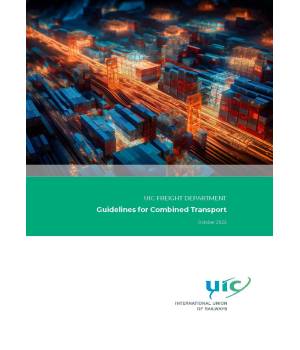
Guidelines for Combined Transport
Efficient logistics has been a driver for societal wealth for many centuries, with recent research by The World Bank even demonstrating that high performance in logistics allows a country to outperform its counterparts in terms of economic growth and development.
On the other hand, logistics and transportation can also have an adverse effect which can be calculated in the external costs on society. With global warming posing a major threat to the world, initiatives need to be developed to reduce the negative impact of transportation, while maintaining its beneficial aspects.
Within this balancing act, multimodal, intermodal and combined transport are playing an ever-increasing role, with road-rail combined transport already representing approximately 50% of all current rail freight volume. Combined transport is considered to be an important element of the new logistics paradigm, as no single mode of transport will be able to win the race to a climate neutral logistics system on its own. Only by combining different modes of transport smartly and efficiently, will a green transport system be viable.
Combined transport has continued to grow in recent decades and will continue to do so, especially with the commitment from the combined transport operators and stakeholders who play an important role in this setting. It is therefore crucial that all parties know how combined transport operates, what the rules of the game are, and which processes need to be followed.
These guidelines, jointly developed with the members of the UIC Combined Transport Special Group, have been written to assist parties willing to get involved in combined transport operations. This manual describes:
- Combined transport terminology
- Why it is called combined transport and its differences to other modes of (rail) transport
- The different stakeholders in combined transport
- The roles and responsibilities of different actors
- Standardisation landscape in Europe
- A step-by-step approach when starting combined transport operations
- How UIC’s Combined Transport Group helps its members in realising safe and efficient combined transport operations
Each section of these guidelines begin with an explanatory diagram, giving the reader a general overview, and follows with a more in-depth examination of the topic. Finally, each chapter ends with a reference section to relevant material on the specific subject.
| Author | UIC |
| ISBN | 978-2-7461-3317-4 |
| Pages | 36 |
Data sheet
- Language
- English
- Format
- Downloadable
- Edition
- Ed. no.1
- Edition date
- 01/10/2023
- Publication date
- 13/12/2023
- Page number
- 36
- Theme
- Combined Transport Transport combiné High speed Grande vitesse Infrastructure Infrastructure Technology Technologie
- sku
- 5-23017E-PDF
- Reference
- 5-23017E
 Cookie preferences
Cookie preferences

